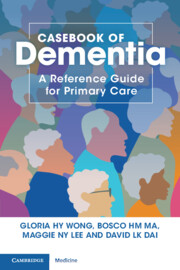1958 results
Chapter 8 - Psychopharmacology of Chronic Aggression and Violence in Forensic Settings
-
-
- Book:
- Seminars in Forensic Psychiatry
- Print publication:
- 13 June 2024, pp 208-228
-
- Chapter
- Export citation
Influence of cognitive reserve on risk of depression and subsequent dementia: A large community-based longitudinal study
-
- Journal:
- European Psychiatry / Accepted manuscript
- Published online by Cambridge University Press:
- 04 June 2024, pp. 1-30
-
- Article
-
- You have access
- Open access
- Export citation
Shifting paradigms in dementia care: navigating new therapies and prevention strategies
-
- Journal:
- The British Journal of Psychiatry / Volume 224 / Issue 6 / June 2024
- Published online by Cambridge University Press:
- 24 May 2024, pp. 187-188
- Print publication:
- June 2024
-
- Article
-
- You have access
- HTML
- Export citation

Casebook of Dementia
- A Reference Guide for Primary Care
-
- Published online:
- 23 May 2024
- Print publication:
- 30 May 2024
-
- Book
-
- You have access
- Open access
- Export citation
Operationalizing the Intolerable Suffering Criterion in Advance Requests for Medical Assistance in Dying for People Living with Dementia in Canada
-
- Journal:
- Cambridge Quarterly of Healthcare Ethics , First View
- Published online by Cambridge University Press:
- 22 May 2024, pp. 1-7
-
- Article
-
- You have access
- Open access
- HTML
- Export citation
Consent and Inclusion of People Living with Dementia (PLWD) in Research: Establishing a Canadian Agenda for Inclusive Rights-Based Practices
-
- Journal:
- Canadian Journal on Aging / La Revue canadienne du vieillissement , First View
- Published online by Cambridge University Press:
- 20 May 2024, pp. 1-8
-
- Article
-
- You have access
- Open access
- HTML
- Export citation
Designing healthcare systems for earlier diagnosis and prevention of dementia
-
- Journal:
- Proceedings of the Design Society / Volume 4 / May 2024
- Published online by Cambridge University Press:
- 16 May 2024, pp. 1637-1646
-
- Article
-
- You have access
- Open access
- Export citation
9 - The Importance of Fuel
-
- Book:
- The Legal Brain
- Published online:
- 08 May 2024
- Print publication:
- 09 May 2024, pp 112-135
-
- Chapter
- Export citation
4 - The Lawyer’s Brain
-
- Book:
- The Legal Brain
- Published online:
- 08 May 2024
- Print publication:
- 09 May 2024, pp 57-64
-
- Chapter
- Export citation
LGI1-antibody encephalitis: how to approach this highly treatable dementia mimic in memory and mental health services
-
- Journal:
- The British Journal of Psychiatry / Volume 224 / Issue 6 / June 2024
- Published online by Cambridge University Press:
- 03 May 2024, pp. 252-257
- Print publication:
- June 2024
-
- Article
-
- You have access
- Open access
- HTML
- Export citation
Integrated Care in Neurology: The Current Landscape and Future Directions
-
- Journal:
- Canadian Journal of Neurological Sciences , First View
- Published online by Cambridge University Press:
- 29 April 2024, pp. 1-9
-
- Article
-
- You have access
- Open access
- HTML
- Export citation
‘I can still swing a spade’: a qualitative exploratory study of gardening groups for people with dementia
-
- Journal:
- Ageing & Society , First View
- Published online by Cambridge University Press:
- 24 April 2024, pp. 1-27
-
- Article
-
- You have access
- Open access
- HTML
- Export citation
Chapter 8 - Neuropsychiatric Disorders
-
-
- Book:
- Seminars in General Adult Psychiatry
- Published online:
- 04 April 2024
- Print publication:
- 18 April 2024, pp 460-526
-
- Chapter
- Export citation
Chapter 17 - Perioperative Medical Management of Older People
-
-
- Book:
- Handbook of Old Age Liaison Psychiatry
- Published online:
- 04 April 2024
- Print publication:
- 11 April 2024, pp 246-265
-
- Chapter
- Export citation
Editorial on common mental health disorders and cognitive decline in a longitudinal Down syndrome cohort
-
- Journal:
- BJPsych Open / Volume 10 / Issue 3 / May 2024
- Published online by Cambridge University Press:
- 11 April 2024, e77
-
- Article
-
- You have access
- Open access
- HTML
- Export citation
Chapter 20 - Interface between Liaison Psychiatry Services for Older People and Wider Community Services
-
-
- Book:
- Handbook of Old Age Liaison Psychiatry
- Published online:
- 04 April 2024
- Print publication:
- 11 April 2024, pp 292-297
-
- Chapter
- Export citation
Chapter 9 - Dementia and Related Disorders
-
-
- Book:
- Handbook of Old Age Liaison Psychiatry
- Published online:
- 04 April 2024
- Print publication:
- 11 April 2024, pp 110-123
-
- Chapter
- Export citation
Chapter 4 - Communication with Older People
-
-
- Book:
- Handbook of Old Age Liaison Psychiatry
- Published online:
- 04 April 2024
- Print publication:
- 11 April 2024, pp 44-58
-
- Chapter
- Export citation
Chapter 8 - Carers’ Needs before, during, and after Hospital Admissions
-
-
- Book:
- Handbook of Old Age Liaison Psychiatry
- Published online:
- 04 April 2024
- Print publication:
- 11 April 2024, pp 96-109
-
- Chapter
- Export citation
“You’re the only thing he comes out [of his room] for”: A qualitative study of engagement between Laughter Care Specialists and families of people with dementia in long-term care
-
- Journal:
- Palliative & Supportive Care , First View
- Published online by Cambridge University Press:
- 08 April 2024, pp. 1-6
-
- Article
-
- You have access
- Open access
- HTML
- Export citation



